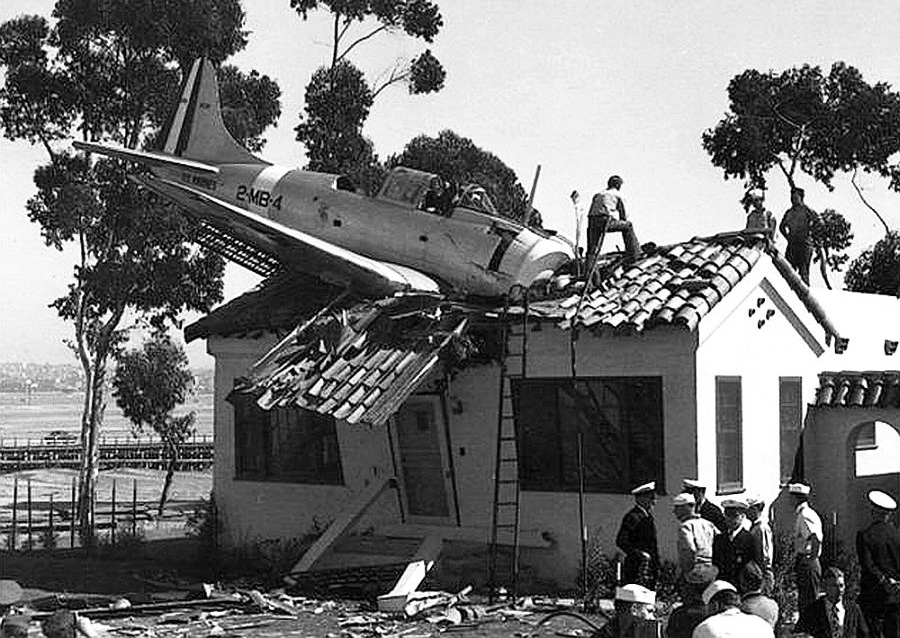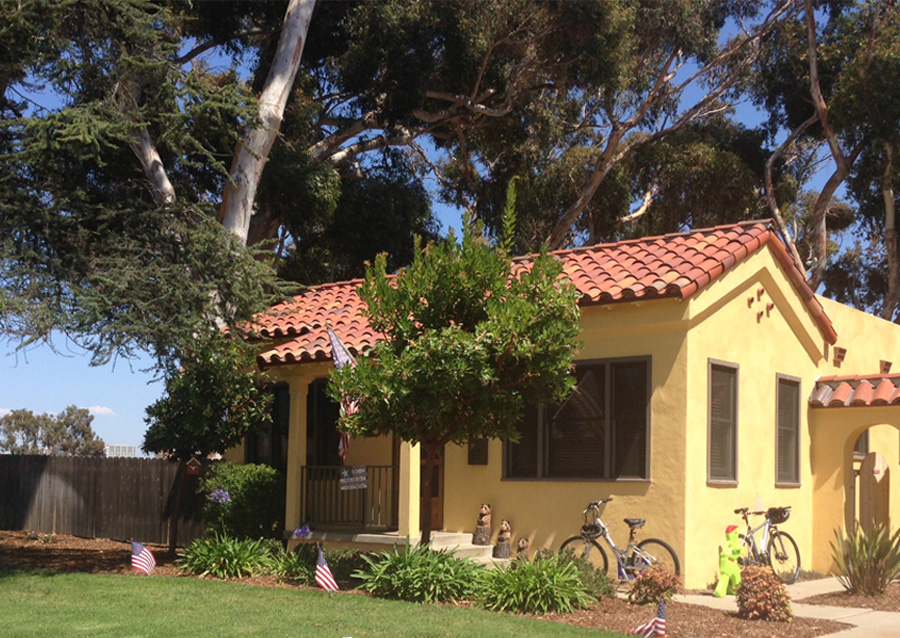 Another in a regular series of fascinating, intriguing, or thoughtful tales about people and places in Nado history — presented by your Coronado Historical Association
Another in a regular series of fascinating, intriguing, or thoughtful tales about people and places in Nado history — presented by your Coronado Historical Association
Well, you don’t see this every day. When this picture surfaced in the last few years, we knew there was an interesting story behind it. The first clues are the old causeway in the background to the left and the architecture of the house that both point right to North Island.
But, when did this happen? What about the house? And, what was the significance of the aircraft that was clearly marked “US Marines?”
Our research showed that the house was one of fifty-odd bungalows built at North Island’s Rockwell Field starting around 1917 or 1918. Famed industrial architect Albert Kahn designed them as part of a master plan for homes, hospitals, hangars and maintenance facilities for the then-Army airfield. These homes, along the water of Spanish Bight, were for non-commissioned officers and they are now part of a designated historic district and landmark.
The aircraft is a Douglas SBD-1 Dauntless dive-bomber one of the Navy’s most successful attack aircraft in the early years of World War II and a shining star of the Battle of Midway. This aircraft (BuNo 1629) was built at the Douglas plant in El Segundo in late 1940.
This aircraft was assigned to the Marine Corps and has squadron markings for the Marine’s Red Devil Squadron (VMB-2) the first Marine squadron assigned the new Dauntless in early 1941. We know that in early 1941, with war clouds gathering, North Island was a center of intensive activity by a newly formed Advanced Carrier Training Group where both Navy and Marine aviators were trained in tactics and advanced gunnery using newly introduced carrier aircraft.
Looking into the record books, we discovered that the Red Devil Squadron was a component of the Second Marine Aircraft Group in 1941, the bulk of which operated from Ewa Field near Pearl Harbor in Hawaii. On 1 July 1941, VMB-2 was redesignated as VMSB-232 and we know it was present in Hawaii during the attack on December 7th. Later, these Marine Dauntless bombers would make their way to the embattled Henderson Field on Guadalcanal in 1942 as members of the “Cactus Air Force”. On 11 July 1941 a new Marine bombing squadron, VMB-221, began operating from North Island under the command of Major Manley with 9 officers and 50 men. It’s logical to assume that some of VMB-2’s aircraft were in North Island for training and some might have helped form VMB-221.
 Putting this all together, we can deduce that this unfortunate Marine aviator was flying a new high-performance aircraft on a training mission. He may have been inexperienced and was undoubtedly returning for a landing (as the most common approach to the field guided along the Fourth Street causeway, the aircraft’s flaps were down, and there is no evidence of a fire from a fully loaded aircraft). At some point the pilot broke hard to the left, perhaps from mechanical problems or as a “wave-off” to avoid other aircraft, and could not regain altitude or airspeed. The highest probability was that this crash took place in the spring of 1941.
Putting this all together, we can deduce that this unfortunate Marine aviator was flying a new high-performance aircraft on a training mission. He may have been inexperienced and was undoubtedly returning for a landing (as the most common approach to the field guided along the Fourth Street causeway, the aircraft’s flaps were down, and there is no evidence of a fire from a fully loaded aircraft). At some point the pilot broke hard to the left, perhaps from mechanical problems or as a “wave-off” to avoid other aircraft, and could not regain altitude or airspeed. The highest probability was that this crash took place in the spring of 1941.
The bungalow survived the crash, was repaired, and survives to this day on Wright Avenue just before the traffic circle on North Island (with a plaque commemorating its brush with disaster presented in 2009 by Mark Aldrich).
Both pilot and crewman walked away from this crash with only minor injuries, but their aircraft would continue a star-crossed career. Although skillfully repaired and returned to service, this Dauntless was never to find glory at Guadalcanal like its squadron mates and was lost in a mid-air collision with an Army P-40 fighter in July 1942 in Hawaii.
Thanks to Mark Aldrich, curator of CHA’s Centennial of Naval Aviation exhibit, and History Detectives Mark Nankivill, Mike O’Keefe, and Dan O’Hara. Photos courtesy of Coronado Historical Association and BRL Pictures. (BL)




